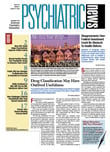For 10 years researchers have been looking at the interaction of antidepressants and genes involved with serotonin. Major studies such as STAR*D now examine pharmacogenetic associations among their study populations. A number of variations in single-nucleotide polymorphisms have been found that influence antidepressant response, although the full picture of how such variants might work in patient populations remains to be described.
A poster presented at the meeting of the American Academy of Child and Adolescent Psychiatry last October serves as an example of this research direction. Researchers observed that the effects of antidepressant treatment varied with the presence or absence of alleles on two genes.
They recruited 83 children and adolescents with depression or anxiety disorders or both for eight weeks of treatment with citalopram, to which the subjects had not been previously exposed. They correlated results with alleles of the serotonin transporter gene (5-HTTLTR) and the tryptophan hydroxylase-2 gene (TPH2). The 5-HTTLTR genotype was sorted by the S or L alleles. The TPH2 genotype was divided into T and G alleles.
Overall, 50 of the 83 patients (60 percent) achieved a satisfactory response (a score of 2 or lower on the Clinical Global Impressions–Improvement scale) after eight weeks. Patients carrying the S allele in the 5-HTTLTR gene managed only a 52 percent response, compared with 78 percent of those without it. The presence of the T allele in the TPH2 gene also was associated with a lower, but not significant, rate of response (51 percent versus 67 percent).
However, the authors found a significant additive affect of both genes on the response rate. Among the 10 patients who carried both the L allele on the 5-HTTLTR gene and the G allele on the TPH2 gene, eight (80 percent) achieved remission, Benyamin Rotberg, M.D., of Geha Mental Health Center in Petach Tikva, Israel, told Psychiatric News. By contrast, only 31 percent of patients with the S and T alleles responded to citalopram. Patients with a mixed set of alleles (G/S or T/L) (n=54) achieved an intermediate 67 percent response.
“We concluded that the two genes act in concert to modulate the clinical response to citalopram,” said Rotberg.
The study was funded by Israel's National Institute of Psychobiology.
In a literature review published in the November 2008 Pharmacogenomics, principal investigator Sefi Kronenberg of the Schneider Children's Medical Center of Israel, and his coinvestigators (including Rotberg) noted that no pediatric pharmacogenomic studies of SSRIs published so far were placebo controlled, and thus they indicate only association, not cause. However, placebo treatment of depression among children and adolescents may now be unethical, so future research will have to compare two active treatments, they wrote.
The researchers also cautioned that developmental and environmental factors influencing the patient must be considered, especially within pediatric populations, given the complex interaction between development, environment, and genes.
Teasing out the connections between genes, drugs, and disease will take time and large, blinded, controlled studies to build on the last decades of work and bring closer the day of targeted, personalized medicine, guided by genetics, wrote the authors.
A summary of “Pharmacogenetics of Selective Serotonin Reuptake Inhibitors in Pediatric Depression and Anxiety” is posted at<www.futuremedicine.com/doi/abs/10.2217/14622416.9.11.1725>.▪
